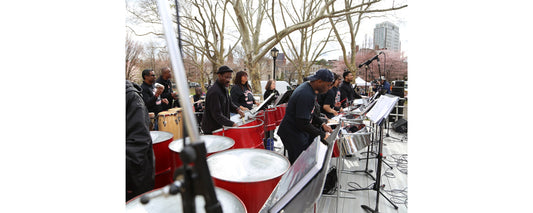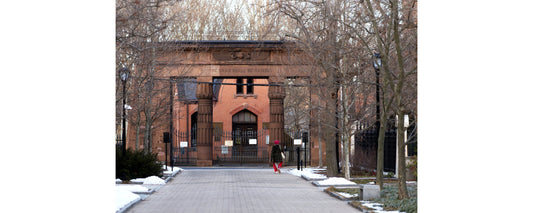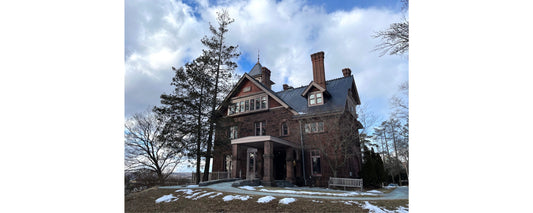The venue for Long Wharf Theatre’s production of A View From The Bridge is actually viewable from two bridges. Staging at the Canal Dock Boathouse, the backdrop for the play by Arthur Miller is a view across New Haven Harbor, cast here as the workplace of an Italian American community of longshoremen in 1950s Brooklyn. It’s a clear benefit of Long Wharf’s still-new itinerancy that it can stage plays at sites that echo the works’ themes and settings. The theatre’s recent production of The Year Of Magical Thinking took place in living rooms around New Haven, where the subject of the loss of a spouse could be brought intimately home.
A View From The Bridge is also a domestic drama. The trouble starts for Eddie Carbone when he returns home from the docks, entering through a door to the literal outdoors (the walkway along the upper story of the boathouse). His wife, Beatrice, and niece, Catherine, greet him with triumphant news: Catherine has been offered a job as a stenographer at “a big plumbing company.” It’s her perfect entry into the adult world, but Eddie registers irritable disapproval. “Look, do I ask for money? I supported you this long. I’ll support you a little more.” He doesn’t want her mixing with plumbers. He doesn’t want her going out in high heels or waving at other men through the window. He ostensibly wants to save her for a better, higher-class life. But it’s increasingly obvious to his troubled wife—played with vividly expressive engagement by Annie Parisse—that what he wants is Catherine to himself.
The play is largely devoted to Eddie’s increasingly crafty, desperate arguments for keeping her at home in the face of increasing pressure from the plot to let her go. “Catherine, I don’t want to be a pest, but I’m telling you, you’re walking wavy,” he says at one point. “I don’t like the looks they’re givin’ you in the candy store.” As played by Dominic Fumusa, whose resume spans an impressive array of screen and stage work, Eddie is a pacing, peevish bull, borderline comic in his vigilance over Catherine’s every exit and entrance. His resting expression suggests the presence of an irritant, a pebble in his shoe that he can’t or won’t consciously address.
The pivotal event is the arrival of Eleanor’s cousins from the Old Country. The taller, blonder of the two—Rodolpho, who also sings, dances, cooks and mends his own clothing—charms Catherine, and they disappear together, returning to the house from a picture show and a tour of Brooklyn in a happy heat that can’t countenance Eddie’s complaints.
“I don’t see you no more. I come home. You’re running around someplace.”
“Well, he wants to see everything, that’s all. We walk across the street. He takes my arm. He almost bows to me. You got him all wrong, Eddie.”
“Katie, he’s only bowing to his passport.”
Where the industrial Red Hook setting comes into play is in the question of American laws, communal codes and how Eddie will navigate between them to break up his niece’s courtship. Rodolpho and Marco are illegal arrivals, reliant on the docks for work they are unable to get in their home country, and it is a matter of custom in the Italian community that their status is protected from the authorities. Eddie visits Alfieri, the lawyer who is also the narrator of the play, to see if the laws of his adopted country might be deployed against Rodolpho instead.
“There’s nothing illegal about a girl falling in love with an immigrant,” says Alfieri.
“What about if the only reason is to get his papers?”
“First of all, you don’t know that.”
“Well I see it in his eyes. He’s laughing at her, and he’s laughing at me.”
“Eddie. I’m a lawyer. I can only deal in what’s proveable.”
In this production, Alfieri is reimagined as a woman, played with professorial sharpness by Patricia Black, which adds a level of futility to Eddie’s attempt to recruit her to his cause. Is there a stronger element of moral disapproval to her insistence that he has no recourse to the law? Is Eddie’s near-comical attempt to suggest that Rodolpho might be a homosexual further hindered by his inability to come out and say as much to a woman? (“He sings! All of a sudden, a whole song comes out of his mouth.”) Would a woman practicing law in Red Hook in the 1950s find herself having to deal with a case like Eddie’s in quite this way? Nevertheless, leaning over the arm of the chair, Alfieri argues with convincingly mounting exasperation.
Watching a tragic hero whom Arthur Miller intended to be every bit as implacable and incorrigible as a Greek king can be like watching a boulder roll toward a cliff. Eddie represents rather than discovers his desire, and this felt equally true of the characters who were the immovable barrier to Eddie’s unstoppable force. Catherine and Rodolpho (Paten Hughes and Mark Junek, respectively) came across as inevitable: rotely, unceasingly eager to become a couple and take their place in the world. “I want you to be my wife, and I want to be a citizen,” Rodolpho says without doubt or wariness. Meanwhile, it paid to watch Antonio Magro as Marco in the background, visibly puzzling over Eddie’s behavior, then beginning to put the pieces together. (This was true of Beatrice as well. Watching Eddie careen through every scene, Parisse masterfully expressed each moment of puzzlement, disbelief, anger and sadness.) It’s telling that Marco and Eddie both arrive at a point where they are demanding restitution from each other, but you can see Marco taking the measure of his own rage and weighing the actions of everyone around him before arriving at his pronouncement.
As staged at the boathouse, the consequence of Eddie’s obsession occurs outside, with longshoremen as witnesses. (Dialogue was transmitted to the audience, still seated inside, by the sound system.) But the tragic end occurs inside, on the living room set, trimmed with the same shipping crates, hooks and pulleys as the outside, the floor roughly planked like a pier. It’s an apt set design for a story that posits terrible havoc in both the home and the community.
A View From The Bridge
presented by Long Wharf Theatre
Canal Dock Boathouse – 475 Long Wharf Dr, New Haven (map)
Tues-Sun through March 10
www.longwharf.org/shows-events/a-view-from-the-bridge
Written by David Zukowski. Image, featuring (from left) Dominic Fumusa, Annie Parisse and Paten Hughes, provided courtesy of Long Wharf Theatre.







